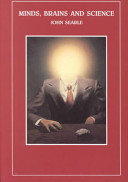The Chinese Room Argument
Suppose that I'm locked in a room and given a large batch of Chinese writing. Suppose furthermore (as is indeed the case) that I know no Chinese, either written or spoken, and that I'm not even confident that I could recognize Chinese writing as Chinese writing distinct from, say, Japanese writing or meaningless squiggles. To me, Chinese writing is just so many meaningless squiggles.
Now suppose further that after this first batch of Chinese writing I am given a second batch of Chinese script together with a set of rules for correlating the second batch with the first batch. The rules are in English, and I understand these rules as well as any other native speaker of English. They enable me to correlate one set of formal symbols with another set of formal symbols, and all that 'formal' means here is that I can identify the symbols entirely by their shapes. Now suppose also that I am given a third batch of Chinese symbols together with some instructions, again in English, that enable me to correlate elements of this third batch with the first two batches, and these rules instruct me how to give back certain Chinese symbols with certain sorts of shapes in response to certain sorts of shapes given me in the third batch. Unknown to me, the people who are giving me all of these symbols call the first batch "a script," they call the second batch a "story," and they call the third batch "questions." Furthermore, they call the symbols I give them back in response to the third batch "answers to the questions." and the set of rules in English that they gave me, they call "the program."
Now just to complicate the story a little, imagine that these people also give me stories in English, which I understand, and they then ask me questions in English about these stories, and I give them back answers in English. Suppose also that after a while I get so good at following the instructions for manipulating the Chinese symbols and the programmers get so good at writing the programs that from the external point of view that is, from the point of view of somebody outside the room in which I am locked—my answers to the questions are absolutely indistinguishable from those of native Chinese speakers. Nobody just looking at my answers can tell that I don't speak a word of Chinese.
Notes:
An argument against the possibility of AI, replacing a computer with an english-speaking human being performing english-instructions on chinese symbols and outputting results. This is like a computer, which does not understand the symbols it is manipulating, but the results look intelligent.
Folksonomies: artificial intelligence computer science knowledge
Taxonomies:
/art and entertainment/books and literature (0.531826)
/food and drink/cuisines/chinese cuisine (0.507744)
/technology and computing/software/shareware and freeware (0.381521)
Keywords:
batch (0.927714 (negative:-0.193805)), symbols (0.804823 (positive:0.072801)), chinese symbols (0.767057 (negative:-0.442315)), Chinese writing (0.646396 (negative:-0.236996)), meaningless squiggles (0.557315 (negative:-0.783905)), certain Chinese symbols (0.513818 (neutral:0.000000)), Chinese Room Argument (0.485998 (neutral:0.000000)), large batch (0.469263 (negative:-0.470788)), English (0.429991 (neutral:0.000000)), rules (0.420734 (neutral:0.000000)), formal symbols (0.407221 (positive:0.595398)), Japanese writing (0.350085 (negative:-0.692850)), certain sorts (0.346447 (neutral:0.000000)), external point (0.339651 (positive:0.270030)), Chinese script (0.336602 (neutral:0.000000)), locked—my answers (0.335788 (neutral:0.000000)), shapes (0.317729 (neutral:0.000000)), questions (0.316280 (neutral:0.000000)), set (0.304903 (positive:0.563652)), results (0.278808 (positive:0.469866)), people (0.275503 (positive:0.295913)), instructions (0.274127 (negative:-0.283481)), story (0.273617 (negative:-0.651269)), response (0.272218 (positive:0.234492)), stories (0.264865 (neutral:0.000000)), view (0.262091 (positive:0.270030)), writing. (0.241358 (negative:-0.600098)), case (0.241286 (negative:-0.402630)), possibility (0.240678 (neutral:0.000000)), english-instructions (0.239904 (neutral:0.000000))
Concepts:
Chinese character (0.952802): website | dbpedia | opencyc | yago
Chinese language (0.813760): dbpedia | freebase | opencyc | yago
Artificial intelligence (0.808886): dbpedia | freebase | opencyc
China (0.704209): geo | dbpedia | ciaFactbook | freebase
Chinese room (0.649819): dbpedia | freebase | yago
Chinese name (0.622918): website | dbpedia | freebase
Classical Chinese (0.602682): dbpedia | freebase | yago
Philosophy of mind (0.591509): dbpedia | freebase





